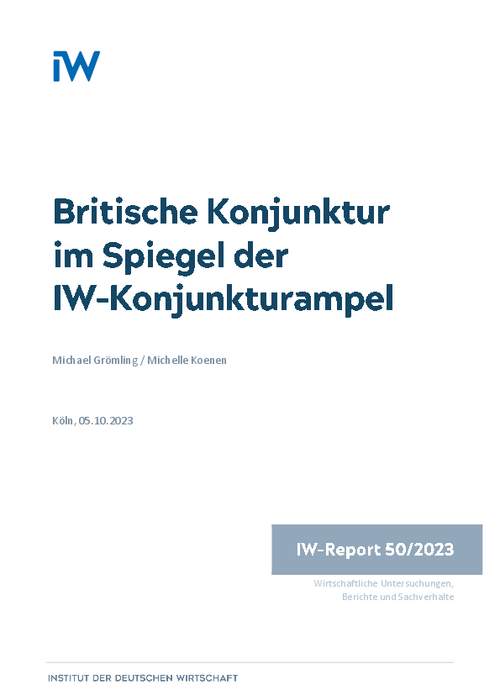The economic development in the United Kingdom is characterised by a multitude of changes. The Brexit decision in 2016 and the exit from the EU in 2020 led to uncertainties, particularly in foreign trade, investment, and the labour market.

British economy in the mirror of the IW economic traffic light

The economic development in the United Kingdom is characterised by a multitude of changes. The Brexit decision in 2016 and the exit from the EU in 2020 led to uncertainties, particularly in foreign trade, investment, and the labour market.
At the same time, the British economy was confronted with the Corona pandemic and the effects of the war in Ukraine. The specific consequences of these individual crises cannot be distinguished from one another due to the overlap in time. Obviously, however, the multiple burdens hit the British economy harder than the Eurozone.
The state and development of the British economy can also be tracked using the IW Business Cycle Traffic Light. The changes in key economic indicators are shown on a monthly basis and over time by the structure of the individual Traffic Light boxes. The IW Business Cycle Traffic Light comprises important indicators from the areas of production, employment, and demand, which have been presented in a straightforward manner for Germany, the Eurozone, the United States and China since 2015. The aim is to provide an overall picture of economic development without having to deal with the disadvantages of an aggregated indicator. When interpreting the data, it should be noted that the respective monthly values of the IW Traffic Light display the economic data for different months in the past. The Traffic Light thus only reflects the status of the economic information available at the current margin and not the actual situation at that point in time. However, these delays are unavoidable to some extent in economic forecasting.
In this report, the United Kingdom is included in the established IW Business Cycle Traffic Light for the first time. This makes it possible to diagnose the specific situation in the United Kingdom based on the selected and available indicators and to compare it with the situation in the other economies covered. Nine of the ten indicators used are available for the United Kingdom. The informative value of the IW Traffic Light for the UK economy is then evaluated based on the development of real gross domestic product. In addition, the development is benchmarked against the Eurozone. It is shown that it can trace the direction of the British economy and its turning points. It is thus a suitable analytical tool for tracking and describing economic dynamics in the United Kingdom.

British economy in the mirror of the IW economic traffic light

More on the topic
![[Translate to English:] Das Gebäude des Weißen Hauses in Washington, D.C. in den Vereinigten Staaten von Amerika. [Translate to English:] Das Gebäude des Weißen Hauses in Washington, D.C. in den Vereinigten Staaten von Amerika.](/fileadmin/_processed_/c/1/csm_GettyImages-2161499385_White_House_Editorial_884306add8.jpg)
Trump or Harris or ...? What Europe must prepare for
A few months before the presidential election in the USA, Donald Trump has a good chance of being re-elected. On the Democratic side, the incumbent president has withdrawn his candidacy after a long period of hesitation, while Vice President Kamala Harris is ...
IW
Compendium 5.5: CO2 Regulation of Road Transport in Europe
With the Compendium CO2 Regulation in Europe, the IW has been providing the interested public with a comprehensive collection of data on the development of CO2 emissions from passenger car traffic in the European Union, as well as on the applicable regulatory ...
IW